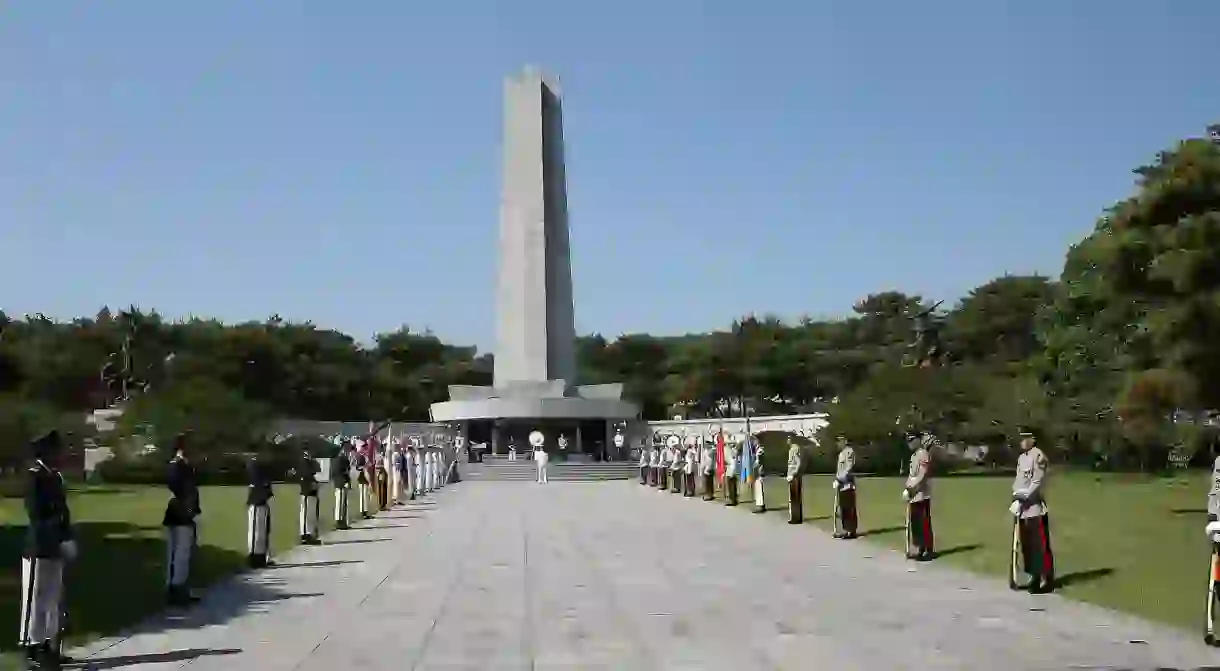Places to Learn About the Korean War in Seoul

The Korean War is perhaps one of the most devastating events in Korean history. Although technically still not over, the fighting that took place between South Korea and North Korea from June 25, 1950 to July 27, 1953 resulted in a full battle death toll on all sides of just over 1.2 million. Furthermore, it drastically affected the country’s society and culture at every level. Find out how at these museums and landmarks around Seoul.
National Museum of Korean Contemporary History
Memorial, Museum

The National Museum of Korean Contemporary History was established in 2012 to educate the public about the nation’s turbulent history through informative exhibitions.
Through its expansive collection of artifacts, photographs, and memorabilia related to the Korean War, visitors can see how the conflict transformed the country – from its industrialization to its pop culture – into the nation that it is today. Not to be missed are the shanty house replicas that provide a rather harrowing look at the devastating conditions in which Seoul was left following the war.
Through its expansive collection of artifacts, photographs, and memorabilia related to the Korean War, visitors can see how the conflict transformed the country – from its industrialization to its pop culture – into the nation that it is today. Not to be missed are the shanty house replicas that provide a rather harrowing look at the devastating conditions in which Seoul was left following the war.
Seoul Museum of History
Museum
Another interesting resource for an in-depth, historic look at the consequences of the Korean War, particularly on a city-level, is the Seoul Museum of History.
As the capital of the South, Seoul was of significant strategic importance during the Korean War. This is conveyed in the museum’s countless photographs, artifacts, and memorabilia, which also illustrate just how destructive the war was on the capital. Additional exhibits inform visitors about the seemingly miraculous way Seoul quickly recovered and modernized after the war, evolving into the global metropolis it is today.
As the capital of the South, Seoul was of significant strategic importance during the Korean War. This is conveyed in the museum’s countless photographs, artifacts, and memorabilia, which also illustrate just how destructive the war was on the capital. Additional exhibits inform visitors about the seemingly miraculous way Seoul quickly recovered and modernized after the war, evolving into the global metropolis it is today.
War Memorial of Korea
Building, Memorial

Housed within the former national army headquarters and situated just a stone’s throw from the USAG Yongsan Army Base, the War Memorial of Korea provides an insightful look at the numerous facets of the Korean War, including the North’s surprise invasion, major battles, and the major roles played by the UN and multiple nations around the globe.
Spread across six indoor halls, the museum exhibits approximately 33,000 artifacts with about 10,000 on display at any given time. Highlights include the Combat Experience Room, which places visitors in the middle of a simulated battle, as well as the outdoor exhibition hall, where restored tanks, aircrafts, and artillery used during the Korean War are on display.
Spread across six indoor halls, the museum exhibits approximately 33,000 artifacts with about 10,000 on display at any given time. Highlights include the Combat Experience Room, which places visitors in the middle of a simulated battle, as well as the outdoor exhibition hall, where restored tanks, aircrafts, and artillery used during the Korean War are on display.
Seoul National Cemetery
Cemetery

The remains of some 165,000 political martyrs, soldiers, and officers, among other members of Korea’s armed forces who participated in various conflicts throughout the country’s history including the Korean War, are entombed at the Seoul National Cemetery.
One of the more moving sites of the cemetery is the Memorial Tower. Here, the memorial tablets of some 104,000 Korean War soldiers whose bodies were never found are housed. Also enshrined are the remains of approximately 7,000 unknown soldiers whose bodies were never identified.
One of the more moving sites of the cemetery is the Memorial Tower. Here, the memorial tablets of some 104,000 Korean War soldiers whose bodies were never found are housed. Also enshrined are the remains of approximately 7,000 unknown soldiers whose bodies were never identified.
DMZ

Though the Korean War ended in 1953 with the signing of an armistice, the North and the South are technically still at war today. To experience the two nations’ contemporary, complicated, and often strained relationship, head just north of Seoul to the heavily fortified Korean Demilitarized Zone (DMZ).
The 250-kilometer-long, four-kilometer-wide stretch of land serves as a buffer zone between the two nations. Due to restricted civilian access, non-military personnel can only visit the DMZ on a tour. Organized tours range from full-day visits and JSA-only tours to nature tours and tours led by North Korean defectors. All are informative and provide a unique look at what is often considered one of the most dangerous borders in the world.
The 250-kilometer-long, four-kilometer-wide stretch of land serves as a buffer zone between the two nations. Due to restricted civilian access, non-military personnel can only visit the DMZ on a tour. Organized tours range from full-day visits and JSA-only tours to nature tours and tours led by North Korean defectors. All are informative and provide a unique look at what is often considered one of the most dangerous borders in the world.













